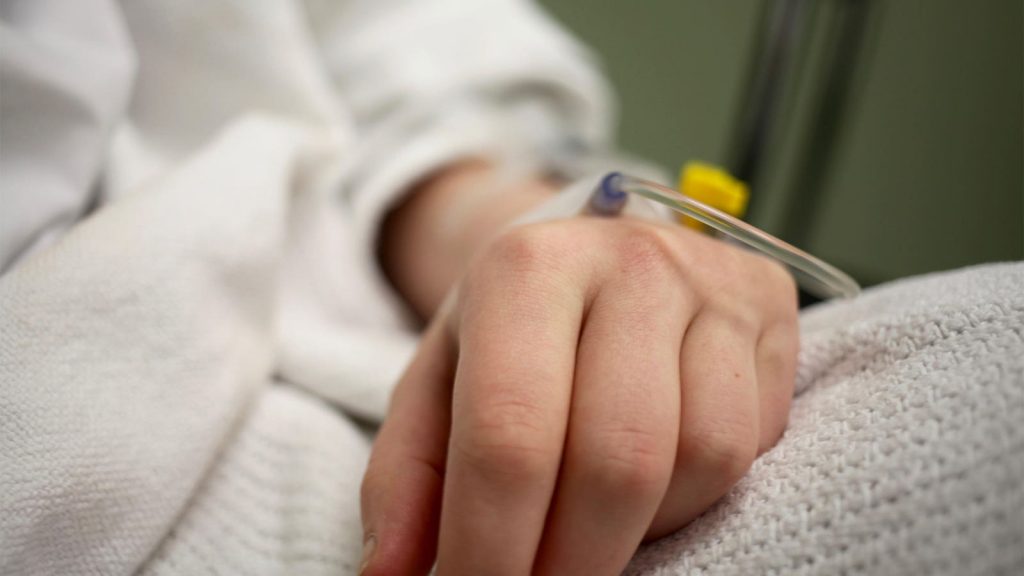
Adding high-dose treosulfan and melphalan as further consolidation therapy for high-risk metastatic Ewing sarcoma failed to improve survival outcomes, a randomized phase III study showed.
In an intention-to-treat population of 109 patients receiving standard induction and consolidation therapy, no significant difference was seen in event-free survival (EFS) between a group that also received high-dose treosulfan-melphalan consolidation and a control group that received no additional therapy, with a median EFS of 1.1 and 0.9 years, respectively (HR 0.82, 95% CI 0.53-1.27, P=0.3741), according to Uta Dirksen, MD, of University Hospital Essen in Germany, and colleagues.
While EFS rates numerically favored the treosulfan-melphalan group at the 1-year mark (51.8% vs 39.8%), rates were similarly low at 3 years (20.09% vs 19.2%), the team reported in the Journal of Clinical Oncology.
At a median follow-up of 3.3 years, the secondary endpoint of overall survival (OS) was similar between groups, with 30 deaths in the treosulfan-melphalan arm and 31 in the control arm (HR 0.96, 95% CI 0.58-1.58):
- OS rates at 3 years: 43.4% vs 37.4%, respectively
- OS rates at 5 years: 26.8% vs 33.6%
“On the basis of these and other findings, we must now acknowledge, once and for all, that further attempts to intensify alkylator-based regimens will not meaningfully break the current EFS ceiling in metastatic EWS [Ewing sarcoma],” wrote Steven DuBois, MD, of Dana-Farber/Boston Children’s Cancer and Blood Disorders Center in Boston, and colleagues, in an editorial accompanying the study. “The current trial simply adds to the totality of evidence over the decades that further chemotherapy intensification is not going to improve outcomes.”
DuBois’s group suggested that treatment strategies in need of further study for high-risk Ewing sarcoma include targeted therapy approaches, innovative local treatments for primary and metastatic lesions, and novel maintenance regimens.
There have been advances in immunotherapy approaches for other sarcomas, they noted, as well as activity when oncogenic fusion drivers are targeted with selective inhibitors, such as in NTRK translocation-driven sarcomas.
“To translate these successes to high-risk EWS, we will need a renewed investment in laboratory research and early phase clinical trials, with promising findings from the early phase clinic rapidly advanced to frontline trials,” they concluded. “Only then will we break the ceiling and see a major increase in cure rates for high-risk EWS.”
The current trial, EWING 2008R3, was conducted in a dozen countries from 2009 to 2018 and included 109 patients (median age 15.8 years, 56% male) who, along with standard induction and consolidation regimens, were randomly assigned 1:1 to high-dose treosulfan-melphalan consolidation or no additional therapy.
Eligible patients had disseminated Ewing sarcoma with metastases to the bone and/or other sites — the study excluded those with only pulmonary metastases. All patients received six cycles of vincristine, ifosfamide, doxorubicin, and etoposide induction, and then eight cycles of vincristine, actinomycin D, and cyclophosphamide consolidation.
The primary endpoint was EFS, defined as the time from randomization to first progression, relapse, secondary malignancy, or death. A total of 82 events were reported (39 in the study arm and 43 among controls). The EFS results were similar in the study’s per-protocol set of 87 patients.
A subgroup analysis appeared to show benefit with high-dose treosulfan-melphalan in patients younger than 14 years old, with 3-year EFS rates of 39.3% versus 9% for older patients (HR 0.40, 95% CI 0.19-0.87, P=0.016).
The authors reported that all patients developed hematologic toxicity, with more infections and gut and renal toxicities observed during consolidation therapy in the treosulfan-melphalan group. Of the documented severe toxicities, hematologic, gut, general condition, and infection toxicities occurred more frequently in the treosulfan-melphalan arm.
-
![author['full_name']](data:image/png;base64,R0lGODlhAQABAAD/ACwAAAAAAQABAAACADs=)
Mike Bassett is a staff writer focusing on oncology and hematology. He is based in Massachusetts.
Disclosures
The study was supported by Deutsche Krebshilfe and sponsored by University Hospital Muenster.
Dirksen disclosed relationships with Lilly and Ipsen. Other co-authors reported relationships with industry.
DuBois reported relationships (including institutional) with Amgen, Bayer, Bristol Myers Squibb Merck, Curis, Eisai, Lilly, Loxo, Pfizer, Roche/Genentech, Salarius Pharmaceuticals, Turning Point Therapeutics, and Y-mAbs Therapeutics.

![author['full_name']](https://clf1.medpagetoday.com/media/images/author/MikeBassett_188.jpg)